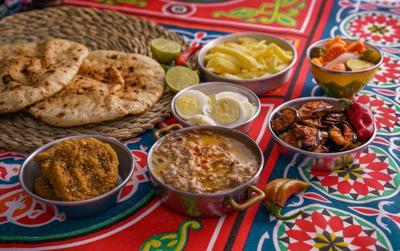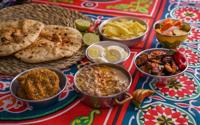Egypt hosted the G20 Task Force on Food Security in 2025, heralding a new focus on the world’s food resources. Food security has become a fashionable term in recent times, driven by ongoing political tensions in some regions.
Making sure the world is fed has long been a talking point, especially since the 2007-2008 global food price crisis. The US State Department website shares how tenuous things once were. Its report explains how “rice prices increased 224 percent, wheat prices increased 108 percent, and corn was up 89 percent.”
Shadows of the Past
This global price shake-up led to significant instability, notably the Arab Spring of late 2010, which began in Tunisia and spread throughout the Middle East. The period coincided with the fall of regimes, civil wars, and a migrant crisis in Europe and beyond.
World leaders had many pressing issues to cover this year. African Press Agency News (APA) shares how delegates discussed the vulnerable global food supply, “which has been strained by climate shocks, conflicts, and economic imbalances.” Clearly, the world doesn’t want a repeat of events 15 years ago, though this remains unlikely.
The Gift of the Nile
It is fitting that the conference took place in Egypt, considering the country’s origins. The very existence of the famous ancient civilization is down to the River Nile’s fertile soils, caused by its annual flooding.
Like other ancient regions, Egypt’s Nile provided rich silt that provided the perfect conditions for agriculture and a flourishing society. Ancient historian Herodotus labeled the desert nation the “Gift of the Nile,” for its water-rich fortune.
Furthermore, a Robert C Allen paper in Science Direct reflects on how this made empire-building a logical progression. “In Egypt, state formation occurred much more rapidly after the adoption of farming than in many other parts of the ancient Near East,” he writes.
An Egyptian Dining Experience
The result was one of the world’s greatest civilizations, famed for its year-long growing season and bountiful harvests. This abundance mindset even carries through into the culture today, as evidenced by the Egyptians’ hospitality and generous nature.
Anyone who has been invited to an Egyptian home-cooked meal knows it isn’t for the impatient, and it’s an ordeal lasting most of the day. Etiquette Scholar gives some pointers for things one must know before accepting any Egyptian dinner invitation:
- Always fill your plate moderately: taking a second helping shows appreciation.
- Expect not to be allowed to leave on your first, or even second, attempt;
- Only use your right hand for eating or greeting hosts.
- Never fill your own glass, though pay attention to your neighbor’s, and be sure to fill theirs when necessary;
- Leave food on your plate if you don’t want any more food.
- Do not eat anything until the oldest male has started their plate.
- Do not bring alcohol, especially if the host is not yet fully acquainted.
Nothing but the Best Egyptian Food
Egyptian dishes at a dinner party vary in scale, depending on the occasion. If someone invites you to their home, they will work hard to impress, showcasing the best they can offer. One must also understand that the country has a class divide, and how Egyptians eat is connected to this reality.
The wealthier classes in Cairo or other cities might dine out in Western-style restaurants. For dinner guests at home, they will likely offer spectacles like Hamam Mahshi. This dish is a small pigeon called a “squab,” stuffed with rice or a cracked green wheat called freekeh.
Respect for the Guests
Treats like cinnamon, nuts, and allspice make up the stuffing. The squab is first simmered in a rich broth, then roasted for a crisp skin. Often, stuffed bell peppers and zucchinis will accompany the birds, along with more rice.
Hamam Mahshi serves as a mark of respect for honored guests. This International Cuisine recipe shows how simple preparing the meal can be, and the key lies in the stuffing. A traveler invited to a Cairo apartment will more likely encounter rice, which is readily available in the Nile Delta.
However, the brilliantly named freekeh, labeled “the freaky ancient grain” by MuFeed Nutrition, might be eaten in more rustic or Nubian households. Those with proximity to rural life are more likely to use this young, roasted green durum wheat.
Superfoods in the Egyptian Diet
This two-millennia-old grain is a superfood with origins in the Levant region of the Middle East, and it creates a smoky, nutty profile for the squab. In reality, one must not expect such delicacies from the typical Egyptian dinner invite. However, there is one dish that one can expect to find in most Egyptian households: molokhia.
While visitors are unlikely to order molokhia at restaurants, this bone broth soup thickened with shredded jute mallow leaves is another historic dish with a regal background.
The name molokhia itself literally translates as “of the kingdom,” says Mareya Ibrahim of MySuperfoodSprinkle.
Eating Like Egyptian Royalty
Maybe there is a good reason for kings enjoying this broth. Molokhia, like freekeh, enjoys a superfood status, according to the International Journal of Research. It means that people who eat it every day have robust immune systems.
“Nutritionally, it has three times the calcium and phosphorus as kale and four times the amount of riboflavin,” reads the paper. If that isn’t enough, the report showcases all the incredible properties from which molokhia eaters benefit. “Molokhia possesses properties that can boost our immune system to help prevent cancer, premature aging…and anaemia,” the review adds.
There is no surprise that Ancient Egypt lasted so long, considering how many superfoods the Egyptians were eating. Great armies march on their stomach, while great nations are built the same way.
Perhaps next time you visit an Egyptian restaurant, ask the proprietor about Egypt’s historical relationship with food. You might be enlightened.

















(0) comments
Welcome to the discussion.
Log In
Keep it Clean. Please avoid obscene, vulgar, lewd, racist or sexually-oriented language.
PLEASE TURN OFF YOUR CAPS LOCK.
Don't Threaten. Threats of harming another person will not be tolerated.
Be Truthful. Don't knowingly lie about anyone or anything.
Be Nice. No racism, sexism or any sort of -ism that is degrading to another person.
Be Proactive. Use the 'Report' link on each comment to let us know of abusive posts.
Share with Us. We'd love to hear eyewitness accounts, the history behind an article.